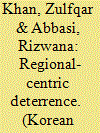|
|
|
Sort Order |
|
|
|
Items / Page
|
|
|
|
|
|
|
| Srl | Item |
| 1 |
ID:
142103


|
|
|
|
|
| Summary/Abstract |
Since the early 1960s, China has been enhancing national power and, in this regard, Chinese space capabilities play a pivotal role. Today, China is second among spacefaring counties, behind the United States, as a measure of human spaceflight, as well as in commercial and military satellite systems. Chinese space technology, in contrast to developed nations, is comparatively cost-effective; China is sharing it with developing nations for their space programs, consequently expanding the pool of spacefaring states. Most significantly, China’s nuclear, military, and space capabilities provide it with an opportunity to reassert itself as a global power, enhancing its strategic outreach and preventing adversaries from contemplating strategies against it.
|
|
|
|
|
|
|
|
|
|
|
|
|
|
|
|
| 2 |
ID:
157762


|
|
|
|
|
| Summary/Abstract |
The paper analyzes India–Pakistan’s lopsided nuclear deterrence and military
strategies. India plans to deliberately escalate a limited war against Pakistan.
Pakistan is determined to neutralize India’s schema on different planes, a limited
conventional, limited nuclear to strategic nuclear wars. It is destabilizing and
complicating South Asia’s nuclear deterrence matrix. Pakistan’s threshold has
depleted due to its “two-frontal” security dilemma. It has considerably increased
Pakistan’s reliance on nuclear weapons. It is deduced that, India–Pakistan’s
inflexible and egocentric cultural mooring is inhibiting them from stepping back
from perilous military strategies, which can trigger miscalculations, enhance
misperceptions, or may lead to the outbreak of accidental/inadvertent limited
conventional or nuclear war. Both countries need to recognize the imperative of a
stable nuclear deterrence and peaceful coexistence instead of crafting unpredictable
and dangerous strategies. The shared risks of nuclear catastrophe should motivate
them to pursue rational and realistic policies.
|
|
|
|
|
|
|
|
|
|
|
|
|
|
|
|
| 3 |
ID:
143688


|
|
|
|
|
| Summary/Abstract |
It is argued that, Pakistan’s “full spectrum” nuclear strategy is based upon the concept of proportionate calibration against the perceived threat of a limited strike by the conventionally much superior military forces of India. Pakistan’s strategy is emitting robust signaling vis-à-vis the apparent strikes with the objective to deter the adversary from operationalizing its flawed limited war doctrine. Moreover, its strategic nuclear forces would perform the function of a dynamic reserve asset and as an ultimate deterrent against India. Most significantly, it would convince India of consequences in the case of deliberate escalation of a crisis or plan of a limited military operation. In essence, it also sufficiently reflects Pakistan’s preparation and “willingness to fight.” In the absence of a conflict resolution mechanism, diplomatic dialogue, both countries’ nuclear deterrent capabilities are expected to perpetuate the element of uncertainty especially during crises.
|
|
|
|
|
|
|
|
|
|
|
|
|
|
|
|
| 4 |
ID:
125253


|
|
|
|
|
| Publication |
2013.
|
| Summary/Abstract |
It is generally believed that a stable nuclear deterrence averts wars between nuclear adversaries, and makes peace secure. This conceptual argument has merit in terms of the prevention of all-out war; but it does not fully address the need to prevent the outbreak of a limited war between two nuclear weapon states. India and Pakistan have already fought one limited war, Kargil, in a nuclear environment. These two relatively new nuclear weapon states rely on nuclear deterrence to address the external threats. While frequently occurring conflicts demonstrate this, a recurrence of limited war cannot be ruled out in this crisis-ridden region, which would be fraught with significant dangers of escalation. Using a qualitative research approach and deploying a structural deterrence theory as a conceptual guiding tool, this paper investigates the nuclear future of the region, including the prospects of war, conflict termination strategy, escalation control, escalation dominance mechanisms, and finally suggests some pertinent lessons for crisis stability.
|
|
|
|
|
|
|
|
|
|
|
|
|
|
|
|
| 5 |
ID:
165052


|
|
|
|
|
| Summary/Abstract |
The peculiar nature of bilateral relations between the United States and China in space is the triggering point of a space security trilemma in South Asia. The spill-over effect of a misperception-misunderstanding dynamic between the United States and China in outer space has brought strategic transformation between the bilateral relations among India-China, India-Pakistan, and China-Pakistan, accentuating a security trilemma. All three states give high importance to their national space programs to achieve socioeconomic goals and to fulfill their national security needs. All three states also recognize the strategic importance of space as a new arena of war. However, the power asymmetry in South Asia has highlighted space-related capabilities as a potent medium of progress and power accumulation. As a result, the challenges in space have triggered and magnified the security trilemma for the South Asian rivals, interconnecting China, India, and Pakistan in the context of an international security complex.
|
|
|
|
|
|
|
|
|
|
|
|
|
|
|
|
| 6 |
ID:
145764


|
|
|
|
|
| Summary/Abstract |
Like other powers, over the last two decades India has reevaluated its military strategy, tactics, and doctrine. The doctrinal reassessment is regional-centric,1 seemingly planned to gain regional influence with the intention of acquiring a great power status. The structural changes in the overall Indian military strategy involve its nuclear doctrine, which is quite worrisome for Islamabad. Particularly disconcerting, Indian doctrinal restructuring, although like any other modern state, is shrouded in ambiguity. This is likely to intensify the “fog of war,”2 and would unfortunately create more uncertainty, especially during crises or conflicts.
|
|
|
|
|
|
|
|
|
|
|
|
|
|
|
|
|
|
|
|
|